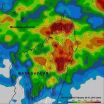(Press-News.org) Last year, Kenya lost 278 elephants to poachers, as compared to 177 in 2010. On the continent of Africa as whole, elephants have declined from an estimated 700,000 in 1990 to 360,000 today due to the demands of the ivory trade.
Spend some time with University of Notre Dame researchers Elizabeth Archie and Patrick Chiyo and you'll gain a better understanding of just what a tragic loss elephant poaching is.
A thinking, reasoning species with extraordinary memories, a strong sense of families and caring and nurturing natures are increasingly at the risk of extinction.
Archie's Notre Dame lab combines fieldwork and genetics research to understand the causes and consequences of social behavior in wild mammals. Her research team examines how migration, mating and social patterns impact the genetics and evolution of a species and its fitness and susceptibility to diseases.
Archie, Clare Booth Luce Assistant Professor of Biology, and Chiyo, a Moreau postdoctoral fellow, use research techniques that range from behavioral observations of wild animals to noninvasive genetic tools to genotype species and their parasites and patterns.
The research lab studies baboons in and elephants in Kenya. Archie and Chiyo work with the Amboseli Elephant Research Project (AERP), located just north of Mount Kilimanjaro in Kenya, which is the longest running study of wild elephants.
In the field, the researchers observe the behavior of the elephants and collect samples for genetic analysis, usually from noninvasive sources, such as dung. In their Notre Dame lab, they use the dung samples to characterize the parasites infecting individual animals and extract DNA to conduct genetic analysis.
Their field work and genetic analysis are revealing fascinating insights into elephant population genetics and social behavior, as well as how human activities alter elephants' social and genetic structures.
Their research has found, for example, that female elephants form strong and lasting social ties with the members of their natal core group. Male elephants, by contrast, disperse from their core natal group at maturity and never join a new core group permanently.
Poaching interrupts the beneficial female social relationships and could lead to lower reproductive rates for females, further reducing the species. For male elephants, age is an important predictor of reproductive success. Poaching appears to reduce the age of first reproduction for males and lead to a reproductive skew, which may increase the rate at which genetic diversity is lost from natural elephant populations.
Archie and Chiyo have also investigated the "crop raiding" behavior of African elephants. Scientists have determined that crop raiding is a male elephant behavior and that not all males participate. The Notre Dame researchers found that up to 20 percent of males may be crop raiders and males are twice as likely to raid at their reproductive peak.
Males over 45 were twice as likely to raid, although some males in their twenties also participated in the raiding. The researchers discovered that younger males were more likely to raid if they were following older role models.
These and other research insights are demonstrating how genetic tolls can be used to understand and preserve social species.
### END
Notre Dame researchers are providing insights into elephant behavior and conservation issues
2012-02-29
ELSE PRESS RELEASES FROM THIS DATE:
3-strikes law fails to reduce crime
2012-02-29
RIVERSIDE, Calif. — California's three-strikes law has not reduced violent crime, but has contributed significantly to the state's financial woes by substantially increasing the prison population, according to a University of California, Riverside researcher.
Declining crime rates in California and nationwide reflect declines in alcohol consumption, not tough-on-crime policies such as three-strikes laws, says Robert Nash Parker, a sociologist and director of the Presley Center for Crime and Justice Studies at UCR.
Parker, who is known internationally for groundbreaking ...
Stopping hormones might help breast cancer to regress
2012-02-29
SEATTLE—As soon as women quit hormone therapy, their rates of new breast cancer decline, supporting the hypothesis that stopping hormones can lead to tumor regression, according to a report e-published in Cancer Epidemiology, Biomarkers, & Prevention.
As part of the national Breast Cancer Surveillance Consortium, researchers studied 741,681 woman-years of data (with a median of 3.3 years per woman) on 163,490 women aged 50-79 who were Group Health Cooperative members and had no prior history of breast cancer.
"This is the first study to look over time at screening ...
Researchers find potential solution to melanoma's resistance to vemurafenib
2012-02-29
TAMPA, Fla. -- Researchers at Moffitt Cancer Center in Tampa, Fla., and colleagues in California have found that the XL888 inhibitor can prevent resistance to the chemotherapy drug vemurafenib, commonly used for treating patients with melanoma.
Vemurafenib resistance is characterized by a diminished apoptosis (programmed cancer cell death) response. According to the researchers, the balance between apoptosis and cell survival is regulated by a family of proteins. The survival of melanoma cells is controlled, in part, by an anti-apoptotic protein (Mcl-1) that is regulated ...
NASA's TRMM satellite measures heavy rainfall in Madagascar from System 92S
2012-02-29
A weak tropical low pressure area known as System 92S, and locally called Irina caused flooding over northern Madagascar less than two weeks after deadly flooding by Tropical Cyclone Giovanna in the south and central part of the island nation. NASA's TRMM satellite measured System 92S's rainfall over Madagascar, and measured some high rain totals.
System 92S didn't have very strong winds when it passed over the coastal city of Vohemar on Madagascar's northeastern coast over the last couple of days, but street flooding was reported.
A rainfall analysis was made at ...
Mingles Media is Please to Announce the Launch of an Online Community for Like-Minded Religious Individuals, with the Aim to Promote Cross Cultural Exchange and Mingling - www.interfaithmingle.com
2012-02-29
Mingles Media, Inc is pleased to announce the launch of www.interfaithmingle.com, an online dating site that is dedicated to people of the Interfaith community all faiths and beliefs. Our site is not just for people who want to date within their own faith but also for people who want to mingle and learn from members of other faiths and beliefs.
The mission of www.interfaithmingle.com is to bring together people who have strong values, who will care for each other and like-minded people of the interfaith communities.
Our faiths may be different, but we must be willing ...
T. Rex's killer smile revealed
2012-02-29
Edmonton -- One of the most prominent features of life-size, museum models of Tyrannosaurus rex, is its fearsome array of flesh-ripping, bone-crushing teeth.
Until recently most researchers only noted the varying size of T. rex's teeth when they studied the carnivore's smile.
But now a University of Alberta paleontologist has discovered that beyond the obvious difference in size of each tooth family, there is considerable variation in the serrated edges of the teeth.
These varying edges or keels not only enabled T.rex's very strong teeth to cut through flesh and bone, ...
SFU researchers help discover new HIV vaccine-related tool
2012-02-29
A new discovery involving two Simon Fraser University scientists could lead to a little known and benign bacterium becoming a vital new tool in the development of a vaccine against human immunodeficiency virus (HIV).
Ralph Pantophlet, a Faculty of Health Sciences assistant professor, and Kate Auyeung, his senior research assistant and lab manager at SFU, and scientists in Italy have made a breakthrough discovery about Rhizobium radiobacter.
The journal Chemistry & Biology has just published their research in its Feb. 24 issue.
The research team has discovered this harmless ...
SFU researchers test sugary solution to Alzheimer's
2012-02-29
Slowing or preventing the development of Alzheimer's disease, a fatal brain condition expected to hit one in 85 people globally by 2050, may be as simple as ensuring a brain protein's sugar levels are maintained.
That's the conclusion seven researchers, including David Vocadlo, a Simon Fraser University chemistry professor and Canada Research Chair in Chemical Glycobiology, make in the latest issue of Nature Chemical Biology.
The journal has published the researchers' latest paper Increasing O-GlcNAc slows neurodegeneration and stabilizes tau against aggregation.
Vocadlo ...
Use of microfluidic chips a first in bitumen-gas analysis
2012-02-29
FEBRUARY 2012 -- A University of Toronto research team has developed a process to analyze the behavior of bitumen in reservoirs using a microfluidic chip, a tool commonly associated with the field of medical diagnostics. The process may reduce the cost and time of analyzing bitumen-gas interaction in heavy oil and bitumen reservoirs.
Dr. David Sinton, Professor with the Department of Mechanical and Industrial Engineering at the University of Toronto, and postdoctoral researcher Dr. Hossein Fadaei are using the chips to examine the way highly pressurized CO2 behaves when ...
Ordinary Guy Comes Up with Way to Help the World
2012-02-29
When talking with Michael Dow, you wouldn't expect that he would come up with a global impacting idea. He's soft spoken, going bald even though he's a bit hairy, he's only attended public schools and sometimes he has memory issues. But that didn't keep him from using his creative writing talent.
"I wanted to find a way to help the world," says Michael, "and stumbled across some ideas. I chose to believe that I could present them simply and thoroughly and published some books and websites."
The main part of his plan, which he has named Project 13 ...


